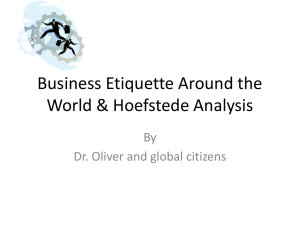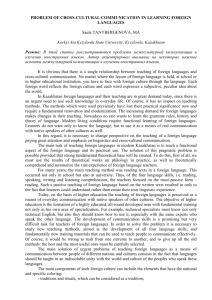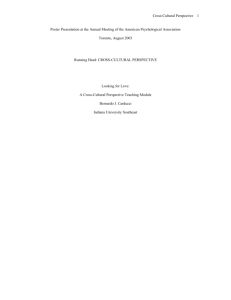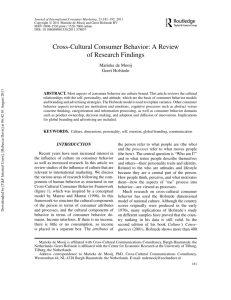Emergent Characteristics..., PSYC 105 & 245
advertisement
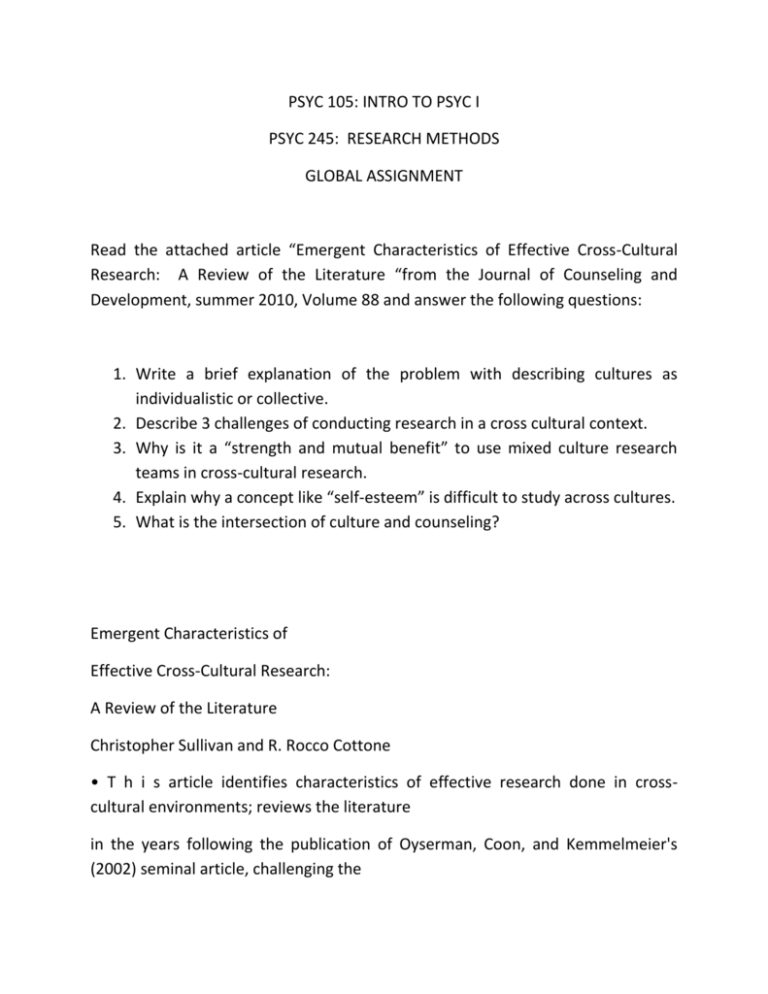
PSYC 105: INTRO TO PSYC I PSYC 245: RESEARCH METHODS GLOBAL ASSIGNMENT Read the attached article “Emergent Characteristics of Effective Cross-Cultural Research: A Review of the Literature “from the Journal of Counseling and Development, summer 2010, Volume 88 and answer the following questions: 1. Write a brief explanation of the problem with describing cultures as individualistic or collective. 2. Describe 3 challenges of conducting research in a cross cultural context. 3. Why is it a “strength and mutual benefit” to use mixed culture research teams in cross-cultural research. 4. Explain why a concept like “self-esteem” is difficult to study across cultures. 5. What is the intersection of culture and counseling? Emergent Characteristics of Effective Cross-Cultural Research: A Review of the Literature Christopher Sullivan and R. Rocco Cottone • T h i s article identifies characteristics of effective research done in crosscultural environments; reviews the literature in the years following the publication of Oyserman, Coon, and Kemmelmeier's (2002) seminal article, challenging the basis for the description of cultures as individualistic or collectivistic; and summarizes major issues concerning research in a cross-cultural environment and outlines how cross-cultural research increases contextual understanding, shows sensitivity to language and culture, and takes a collaborative and flexible stance. How different research designs allow for greater inclusion of a variety of cultural perspectives and implications for practice are addressed. Interest in how cultural differences affect the counseling process has been among the most important and innovative approaches to develop in the field of counseling and psychotherapy in the past 40 years. Multiculturalism, the culmination of this culturally sensitive stance, has been identified as "a fourth force" (Pedersen, 1991) following the previous psychodynamic, behavioral, and humanistic movements in counseling. Cultural awareness has transformed the practice of counseling through efforts to gain greater sensitivity and acceptance of different cultural perspectives and attitudes. Moving beyond the growing awareness of the 1960s and 1970s that people from different places viewed and experienced the world in different ways, culturally sensitive counseling has come to benefit from the collected information and insights in a variety of different fields, particularly cultural anthropology (Geertz, 1973), sociology, and intercultural communications (Hall, 1976). One of the major organizing characteristics across disciplines has been the categorization of different cultures as either individualistic or collectivistic. It has been accepted as almost self-evident that individuals from some cultures had a more collectivistic identity and identified more with the larger social group to which they belonged, whereas other cultures were more individualistic and were made up of individuals less concerned with the overall group's welfare and more motivated by individual concerns. Hofstede's (1980) Culture's Consequences: International Differences in Work-Related Values was based on a study of employees in a multinational corporation that justified these conclusions by providing data validating the categories and providing an empirical basis for describing the world's cultures as individualist or collectivist. Almost immediately, Hofstede's descriptive model of how cultures can be categorized was embraced as an axiomatic description of cultural differences. Although Hofstede identified power distance, uncertainty avoidance, and masculinity-femininity as other important distinctions between cultures, the individualist-collectivist distinction is most enthusiastically embraced and referenced in cultural studies (an Internet search on September 1, 2007, showed more than 20,000 references to the concept). This commonsense understanding of describing and categorizing cultural differences was upended with the publication of Oyserman, Coon, and Kemmelmeier's (2002) examination of the empirical work using the individualism collectivism model done between 1980 and 2002. Oyserman etal. examined roughly 170 studies using Hofstede's (1980) framework and questioned whether the practice of individuallevel analysis could accurately lead to valid country-level conclusions as Hofstede and later researchers did. Oyserman et al. also identified "the narrow focus on undergraduates as research participants, single group contrasts, and enormous heterogeneity in how researchers conceptualize" (p. 6) individualism and collectivism as other major limitations to the approach. In addition to questioning the underlying premise of measuring individualism and collectivism, Oyserman et al. criticized the "apparent willingness to accept any cross national difference as evidence of IND-COL [individualist collectivist] processes" (p. 44). These limitations and associated questionable research results flew in the face of a construct that had been assumed to be self-evident, and the empirical foundation for separating cultures into these two major categories was thus irreparably damaged. Although the individualism-collectivism model continues as a theoretical model, the questions raised by Oyserman et al. do not allow for continued acceptance of the individualist-collectivist construct as a simple, clear method of distinguishing between and categorizing cultures. The critique by Oyserman et al. is an alert to the cross-cultural research community: It encourages a culturally sensitive analysis of distinctions made about cultures—distinctions that should not be accepted globally or solely from a Western cultural stance.

